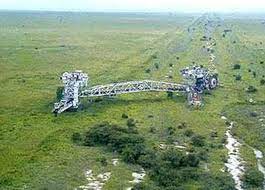
A decaying excavator abandoned at the proposed route of Jonglei Canal since 1983. | File photo.
A Sudanese representative to the East African Meteorological Society has cautioned the South Sudan government against digging of the Jonglei Canal, citing climate-related impact.
Dr. Hassan Mohammed believes, excavation of the canal may affect the biodiversity in the area and the neighboring Blue Nile in Sudan.
Speaking to Eye Radio from Khartoum yesterday, he appealed to the government of South Sudan to preserve the environment in the suds region.
“We have to talk about the Jonglei canal, I suggest we have to keep these swamps and if there are any negative impacts, we have to tackle them but we have to keep that environment with its diversity and with its supply of moisture to the local rain,” he said.
In February this year, the Vice President for Infrastructure cluster called for the resumption of Jonglei Canal excavation to prevent flood disaster in Jonglei and Unity states.
According to Vice President Taban Deng Gai, the devastating floods in areas of Bentiu, Fangak, and Bor towns are result of high volume of water from Lake Victoria.
He said the displacement caused by flooding could be avoided by opening the waterways and the digging of Jonglei Canal.
However, Dr. Hassan Mohamed who represents the East African meteorological society has expressed fears the canal could lead to the dissipation of moisture in the wetland.
“It shouldn’t be drained. That is my opinion and I think it is also internationally accepted as an international park or reserve for this biodiversity for animals or plant species and others,” Mohammed.
Dr. Hassan Mohammed – a veteran Sudanese meteorologist with forty years of experience stressed that the the wetland is home to a rich biodiversity, and as such it should not be severed.
“This sudd area is a very important environmental area and there are different types of species living there from big animals to reptiles to insects and trees and plants, so this is a very rich area of biodiversity,
“We have to adjust our activities, because it is nearly 600 kilometers long and about 200 or 300 kilometers wide, it provide a lot of moisture and this moisture during the rainy season comes back as rain, and most of this water vapor comes back downstream in the north eastern part of the swamps,”
Dr. Hassan assumed that if the canal swamps are drained, it will affect some parts of the neighboring Sudan.
“The Blue Nile has a very large percentage of rainfall recycling, the local evaporation contributes to the local rain. If these swamps of South Sudan are drained and water vapor are no longer provided from that place, the amount of rain in Damazin or Blue Nile area will diminish,
“And that will affect a very important fertile area for Northern Sudan and also for Southern Sudan which is very adjacent to that place where a lot of cultivation or sorghum, sesame or sunflower are being cultivated on those areas.”
The Jonglei Canal is a project designed to divert access water from the vast wetlands of Upper Nile downstream to Sudan and Egypt.
The project started during the colonial period in 1954, a year before Sudan gained its independence.
However, it was halted, following a series of riots by students and the formation of SPLM/A in 1984 which culminated into the second Sudanese Civil War.
Experts have since warned of catastrophic environmental and social issues including the collapse of fisheries, drying up of grazing lands, a drop-in groundwater levels, and a reduction of rainfall in the region.
Support Eye Radio, the first independent radio broadcaster of news, information & entertainment in South Sudan.
Make a monthly or a one off contribution.
Copyright 2024. All rights reserved. Eye Radio is a product of Eye Media Limited.